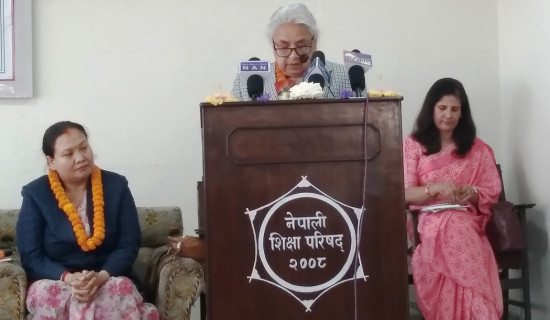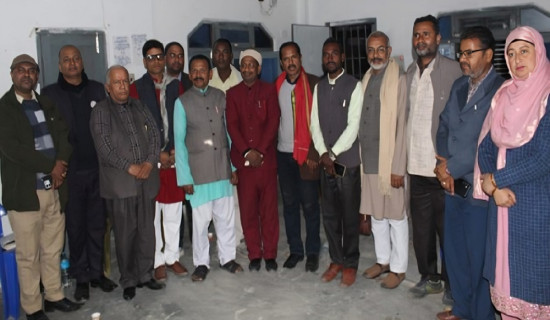- Sunday, 13 April 2025
Education Should Train Students To Think Critically
Education prolongs beyond just achieving academic success. Its true principle is exposed when individuals can effectively handle challenges that the future has planned for them. Consequently, the education system should train students to live cordially, concentrating on teaching the skills necessary to lead a meaningful life. In addition to guiding students through appropriate curricula, teachers should work to equip students with practical life skills, such as developing abilities in problem-solving, making sound decisions, and becoming socially aware individuals.
The practice of fostering empathy is equally crucial to turn an individual into a social creature. Empathetic values are vital for humankind to thrive and live peacefully. Education serves as a vibrant constituent for the all-inclusive development of humanity. The goal is to attain a harmonious state of the body, mind, and soul. There is an urgent need to revise the current education system of Nepal if we are to see our children develop physically, mentally, and emotionally.
Practical solutions
The education system needs to incorporate skills development courses that empower individuals to be practical and logically address life’s challenges. Skills relevant to life inspire abstract thinking and enable one to tackle problems from various viewpoints, leading to practical solutions. Students should be encouraged to apply their theoretical knowledge in real-world situations. Most importantly, research skills should be the topmost priority.
One of the most important responsibilities of the nation in terms of imparting education is to develop an education system that fulfil the needs of the individual, family, society, community, and the nation as a whole. While knowledge-based education is significant, skills-based education holds even greater importance as it equips students to know the purpose of life. Hence, vocational training and skills development should be brought into priority. Students should be taught to prioritise how to think rationally over what to think.
Life skills encompass the abilities for positive and adaptive behaviour, which enable individuals to manage the demands and difficulties of life successfully. Education focused on skills is beneficial in various ways. The most significant aspect is that it equips students with essential tools for personal and social development, such as independent thinking, socialisation, making new friends, and knowing how to act when parents or teachers are not available to assist. Life skills serve as the foundation for students to put their theoretical knowledge into practice. The education system should inform students about essential life skills such as the ability to concentrate, effective communication, inspiring others to achieve their potential, mechanical abilities, and emotional intelligence.
Acquiring these skills helps individuals become more conscious, self-assured, creative, empathetic, and better equipped to handle stress and emotions. According to Paulo, education is the process of nurturing students' awareness to be subject rather than object through critical consciousness. This implication may foster not only the creativity of students but also their critical thinking skills. To enhance critical thinking skills, different assessments should be given to the students that may help them demonstrate particular abilities. For example, individuals should be encouraged to do reflective practices after the completion of each chapter, sparking their curiosity and making them question everything they have learned.
Similarly, incorporating the Socratic Method in teaching and learning can also stimulate the thinking skills of students so that they can prevent themselves from becoming the victims of indoctrination and superstitions. In today’s highly competitive and challenging global market, those with creativity and critical thinking skills are more likely to succeed. Organisations look for employees who can present their tasks in agreeable ways that also lead towards achieving organisational goals.
Additionally, the world is undergoing rapid changes, and individuals are confronted with numerous challenges. Problem-solving skills are vital for addressing these challenges effectively. To achieve success in any sphere, critical thinking skills are indispensable. It involves the ability to think logically about what actions to take and what beliefs to hold. Critical thinking allows individuals to understand the logical relationships between ideas, identify, develop, and assess arguments, recognise inconsistencies and common reasoning errors, methodically solve problems, and reflect on their own beliefs and values.
Early exposure
The teaching approach needs to be rational. Early exposure to skill training will provide students with the chance to explore different choices and successively select their area of interest. Parents, too, can play an active role in imparting different skills at home by assigning different projects that present real-world scenarios.
They should be guided well with theoretical knowledge and practical practice. Developing life skills is fundamentally about assisting children in cultivating sound judgment and positive habits for long-term stability, well-being, and achievement. There is an urgent need from government, policy makers, NGOs, and INGOs working in the sector of education to bring life-relevant skills in curriculum and conduct research time and again to know the development in the sector.
(The author is a visiting assistant professor at Kathmandu University School of Law and Engineering.)
















